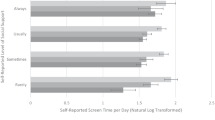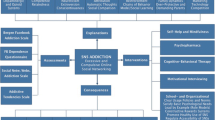Abstract
This study performed a cross-cultural adaptation and identified validity evidences of the smartphone addiction scale-long version (SAS-LV) in a sample of Brazilian university students (n = 504; Mage = 21.7; SD = 3.03) and adults (n = 578; Mage = 37.8; SD = 11.8). The adaptation of the SAS-LV was performed based on specific protocols, with the participation of experts in the field. The factorial structure was evaluated by using confirmatory factor analysis (CFA), principal component analysis (PCA), and network analysis (NA). The CFA did not detect adequate parameters, but the PCA presented a five-factor solution, explaining 55.2% of the variance. All items from the original version were retained because they had a factor load above 0.3. The SAS-LV presented good reliability indexes (α = .93). The NA indicated that the instrument had good psychometric properties for the two populations studied. The Portuguese version of the SAS-LV presented good validity indexes and can be used as a screening tool for smartphone addiction. Este estudo realizou a adaptação transcultural e identificou evidências de validade da smartphone addiction scale-long version (SAS-LV) para uma amostra de universitários (n = 504; Midade = 21,7; DP = 3,03) e adultos (n = 578; Midade = 37,8; DP = 11,8) brasileiros. A adaptação da SAS-LV foi realizada a partir de protocolos específicos, com a participação de especialistas da área. A estrutura fatorial foi avaliada pela análise fatorial confirmatória (AFC), análise de componentes principais (ACP) e análise de rede (AR). A AFC não apresentou parâmetros adequados, mas a ACP apresentou uma solução com cinco fatores, explicando 55,2% da variância. Todos os itens da versão original foram mantidos porque apresentaram carga fatorial acima de 0,3. A SAS-LV apresentou bons índices de confiabilidade (α = 0,93). A AR indicou um bom ajuste psicométrico do instrumento para as duas populações estudadas. A versão em português da SAS-LV apresentou bons índices de validade, podendo ser utilizada como instrumento de rastreio para a dependência de smartphone.
Resumen
Este estudio condujo una adaptación transcultural y identificó evidencias de validez de la smartphone addiction scale-long version (SAS-LV) para una muestra de estudiantes universitarios (n = 504; Medad = 21,7; DE = 3.03) y adultos (n = 578; Medad = 37,8; DE = 11.8) brasileños. La adaptación del SAS-LV ocurrió a partir de protocolos específicos, con la participación de expertos en el área. La estructura factorial fue evaluada mediante análisis factorial confirmatorio (AFC), análisis de componentes principales (ACP) y análisis de red (AR). El AFC no presentó parâmetros adecuados, pero el ACP presentó una solución de cinco factores, explicando 55.2% de la varianza. Todos los elementos de la versión original se mantuvieron porqué tenían carga factorial superior a 0.3. El SAS-LV tuvo buenos índices de confiabilidad (α = 0.93). El AR indicó buen ajuste psicométrico del instrumento para las dós poblaciones estudiadas. La versión en portugués del SAS-LV presentó buenos índices de validez, pudiendo ser utilizada como herramienta de detección para la dependencia de los smartphones.


Similar content being viewed by others
References
Akodu, A. K., Akinbo, S. R., & Young, Q. O. (2018). Correlation among smartphone addiction, craniovertebral angle, scapular dyskinesis, and selected anthropometric variables in physiotherapy undergraduates. Journal of Taibah University Medical Sciences, 13(6), 528–534. https://doi.org/10.1016/j.jtumed.2018.09.001.
Alhassan, A. A., Alqadhib, E. M., Taha, N. W., Alahmari, R. A., Salam, M., & Almutairi, A. F. (2018). The relationship between addiction to smartphone usage and depression among adults: A cross-sectional study. BMC Psychiatry, 18(1), e148. https://doi.org/10.1186/s12888-018-1745-4.
Andrade, A. L. M., Kim, D. J., Caricati, V. V., Martins, G. D. G., Kirihara, I. K., Barbugli, B. C., ... & De Micheli, D. (2020c). Validity and reliability of the Brazilian version of the smartphone addiction scale-short version for university students and adult population. Estudos de Psicologia (Campinas), 37. e190117. https://doi.org/10.1590/1982-0275202037e190117
Andrade, A. L. M., Scatena, A., Bedendo, A., Enumo, S. R. F., Dellazzana-Zanon, L. L., Prebianchi, H. B., de Lara Machado W. & de Micheli, D. (2020a). Findings on the relationship between Internet addiction and psychological symptoms in Brazilian adults. International Journal of Psychology, 55(6), 941–950. https://doi.org/10.1002/ijop.12670.
Andrade, A. L. M., Scatena, A., Martins, G. D. G., de Oliveira Pinheiro, B., da Silva, A. B., Enes, C. C., Oliveira, W. A., et al. (2020b). Validation of smartphone addiction scale-short version (SAS-SV) in Brazilian adolescents. Addictive Behaviors, 106540. https://doi.org/10.1016/j.addbeh.2020.106540.
APA (American Psychiatry Association). (2013). Diagnostic and statistical manual of mental disorders (DSM–5). Porto Alegre: Artmed.
Baroni, S., Marazziti, D., Mucci, F., Diadema, E., & Dell’Osso, L. (2019). Problematic Internet use in drug addicts under treatment in public rehab centers. World Journal of Psychiatry, 9(3), 55–64. https://doi.org/10.5498/wjp.v9.i3.55.
Chen, J., & Chen, Z. (2008). Extended Bayesian information criteria for model selection with large model spaces. Biometrika, 95, 759–771. https://doi.org/10.1093/biomet/asn034.
Ching, S. M., Yee, A., Ramachandran, V., Lim, S. M. S., Sulaiman, W. A. W., Foo, Y. L., & kee Hoo, F. (2015). Validation of a Malay version of the smartphone addiction scale among medical students in Malaysia. PLoS One, 10(10), e0139337. https://doi.org/10.1371/journal.pone.0139337.
Cruz, F. A. D., Scatena, A., Andrade, A. L. M., & De Micheli, D. (2018). Evaluation of Internet addiction and the quality of life of Brazilian adolescents from public and private schools. Estudos de Psicologia (Campinas), 35(2), 193–204. https://doi.org/10.1590/1982-02752018000200008.
Demirci, K., Orhan, H., Demirdas, A., Akpinar, A., & Sert, H. (2014). Validity and reliability of the Turkish version of the smartphone addiction scale in a younger population. Klinik Psikofarmakoloji Bülteni-Bulletin of Clinical Psychopharmacology, 24(3), 226–234. https://doi.org/10.5455/bcp.20140710040824.
Epskamp, S., Borsboom, D., & Fried, E. I. (2018). Estimating psychological networks and their accuracy: A tutorial paper. Behavior Research Methods, 50(1), 195–212. https://doi.org/10.3758/s13428-017-0862-1.
Horwood, S., & Anglim, J. (2019). Problematic smartphone usage and subjective and psychological well-being. Computers in Human Behavior, 97, 44–50. https://doi.org/10.1016/j.chb.2019.02.028.
International Test Commission (ITC). (2018). ITC guidelines for translating and adapting tests (second edition). International Journal of Testing, 18(2), 101–134. https://doi.org/10.1080/15305058.2017.1398166.
Internet Steering Committee (ICS). (2019). Pesquisa sobre o uso das Tecnologias de Informação e Comunicação nos domicílios brasileiros - TIC Domicílios 2018. [Research on the use of information and communication technologies in Brazilian households – TIC Households 2018] (Vol. 1). Brasilia: Comitê Gestor de Internet. Retrieved October 25, 2019, from: https://www.cetic.br/publicacao/pesquisa-sobre-o-uso-das-tecnologias-de-informacao-e-comunicacao-nos-domicilios-brasileiros-tic-domicilios-2017/.
Jung, J., & López-Bazo, E. (2019). On the regional impact of broadband on productivity: The case of Brazil. Telecommunications Policy, in press., 44, 101826. https://doi.org/10.1016/j.telpol.2019.05.002.
Kheradmand, A., Amirlatifi, E. S., Sohrabi, M. R., & Meybodi, A. M. (2019). Validation of the Persian smartphone addiction scale among Tehran university students, Iran. International Journal of High Risk Behaviors and Addiction, 8(1), e81176. https://doi.org/10.5812/ijhrba.81176.
Khoury, J. M., Freitas, A. A. C., Roque, M. A. V., Albuquerque, M. R., Neves, M. D. C. L., & Garcia, F. D. (2017). Assessment of the accuracy of a new tool for the screening of smartphone addiction. PLoS One, 12(5), e0176924. https://doi.org/10.1371/journal.pone.0176924.
Kwon, M., Lee, J. Y., Won, W. Y., Park, J. W., Min, J. A., Hahn, C., Kim, D. J., et al. (2013). Development and validation of a smartphone addiction scale (SAS). PLoS One, 8(2), e56936. https://doi.org/10.1371/journal.pone.0056936.
Laurence, P. G., Busin, Y., da Cunha Lima, H. S., & Macedo, E. C. (2020). Predictors of problematic smartphone use among university students. Psicologia: Reflexão e Crítica, 33, 1–13. https://doi.org/10.1186/s41155-020-00147-8.
Lee, J. J., Wang, M. P., Luk, T. T., Guo, N., Chan, S. S., & Lam, T. H. (2020). Associations of electronic device use before and after sleep with psychological distress among Chinese adults in Hong Kong: Cross-sectional study. JMIR Mental Health, 7(6), e15403. https://doi.org/10.2196/15403.
Li, S., Da Xu, L., & Zhao, S. (2018). 5G Internet of Things: A survey. Journal of Industrial Information Integration, 10, 1–9. https://doi.org/10.1016/j.jii.2018.01.005.
Lin, Y. H., Chiang, C. L., Lin, P. H., Chang, L. R., Ko, C. H., Lee, Y. H., & Lin, S. H. (2016). Proposed diagnostic criteria for smartphone addiction. PLoS One, 11(11), e0163010. https://doi.org/10.1371/journal.pone.0163010.
Pawlowska, B., Zygo, M., Potembska, E., Kapka-Skrzypczak, L., Dreher, P., & Kedzierski, Z. (2015). Prevalence of Internet addiction and risk of developing addiction as exemplified by a group of Polish adolescents from urban and rural areas. Annals of Agricultural and Environmental Medicine, 22(1), 129–136. https://doi.org/10.5604/12321966.1141382.
de Oliveira Pinheiro, B., Monezi Andrade, A. L., Lopes, F. M., Reichert, R. A., de Oliveira, W. A., da Silva, A. M. B., & De Micheli, D. (2020). Association between quality of life and risk behaviors in Brazilian adolescents: An exploratory study. Journal of Health Psychology. In Press. https://doi.org/10.1177/1359105320953472.
Rücker, J., Akre, C., Berchtold, A., & Suris, J. C. (2015). Problematic Internet use is associated with substance use in young adolescents. Acta Paediatrica, 104(5), 504–507. https://doi.org/10.1111/apa.12971.
Schaub, M. P., Tiburcio, M., Martinez, N., Ambekar, A., Balhara, Y. P. S., Wenger, A., Poznyak, V., et al. (2018). Alcohol e-Help: Study protocol for a web-based self-help program to reduce alcohol use in adults with drinking patterns considered harmful, hazardous or suggestive of dependence in middle-income countries. Addiction, 113(2), 346–352. https://doi.org/10.1111/add.14034.
Sfendla, A., Laita, M., Nejjar, B., Souirti, Z., Touhami, A. A. O., & Senhaji, M. (2018). Reliability of the Arabic smartphone addiction scale and smartphone addiction scale-short version in two different Moroccan samples. Cyberpsychology, Behavior and Social Networking, 21(5), 325–332. https://doi.org/10.1089/cyber.2017.0411.
Silva, M. A. A., Andrade, A. L. M., & De Micheli, D. (2018). Evaluation of the implementation of brief interventions to substance abuse in a socieducative context. Revista Psicologia em Pesquisa, 12(1), 1–10. https://doi.org/10.24879/2018001200100125.
Silver, L., Smith, A., Johnson, J., Taylor, K., Jiang, J., Anderson, M., & Rainie, R. (2019). Mobile connectivity in emerging economies. Washington: Pew Research Center Retrieved October 25, 2019, from: https://www.pewinternet.org/wp-content/uploads/sites/9/2019/03/PI_2019.03.07_Mobile-Connectivity_FINAL.pdf.
Wang, P. Y., Chen, K. L., Yang, S. Y., & Lin, P. H. (2019). Relationship of sleep quality, smartphone dependence, and health-related behaviors in female junior college students. PLoS One, 14(4), e0214769. https://doi.org/10.1371/journal.pone.0214769.
Wu, C. S., Wong, H. T., Yu, K. F., Fok, K. W., Yeung, S. M., Lam, C. H., & Liu, K. M. (2016). Parenting approaches, family functionality, and Internet addiction among Hong Kong adolescents. BMC Pediatrics, 16, e130. https://doi.org/10.1186/s12887-016-0666-y.
Yamauchi, L. M., Andrade, A. L. M., Pinheiro, B. O., Enumo, S. R. F & De Micheli, D. (2019). Evaluation of the social representation of the use of alcoholic beverages by adolescents. Estudos de Psicologia (Campinas), 36, e180098. https://doi.org/10.1590/1982-0275201936e180098
Acknowledgements
We thank the Department of Psychiatry of the Catholic University of Korea for their support and partnership in this study. This study was partly financed by the Pontifical Catholic University of Campinas.
Funding
This study was partly financed by the Pontifical Catholic University of Campinas.
Author information
Authors and Affiliations
Contributions
Andrade, Scatena, Enumo, and De Micheli were responsible for the study design and data acquisition. Andrade was responsible for the data analyses. Scatena, Kim, De Micheli, and Enumo cooperated in the technical procedures and interpretation of the data. Andrade drafted the manuscript. All the authors are responsible for the contents and have revised and approved its final version. Furthermore, the authors have declared there were no competing interests.
Corresponding author
Ethics declarations
Conflict of Interest
The authors declare that they have no conflict of interest.
Statement of Human Rights
All procedures performed in studies involving human participants were in accordance with the ethical standards of the institutional research committee and with the 1964 Helsinki Declaration and its later amendments or comparable ethical standards. This study was approved by the Research Ethics Committee of the Pontifical Catholic University of Campinas (CAAE 75837417.1.0000.5481; No. 2.326.766). The translation and cultural adaptation of the instrument was authorized by the original authors of the SAS-SV (Kwon et al. 2013).
Informed Consent
Informed consent was obtained from all individual adult participants included in the study.
Rights and permissions
About this article
Cite this article
Andrade, A.L.M., Kim, DJ., Scatena, A. et al. Validity and Reliability of the Brazilian Version of the Smartphone Addiction Scale-Long Version (SAS-LV). Trends in Psychol. 29, 302–319 (2021). https://doi.org/10.1007/s43076-020-00046-y
Accepted:
Published:
Issue Date:
DOI: https://doi.org/10.1007/s43076-020-00046-y




